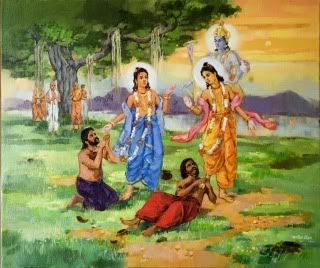Tattva-viveka
Lord Chaitanya's and Nityananda's "Mercy Cases": Realizing Our Ineligibility
Karnamrita Das - October 17, 2015 2:41 pm
Lord Chaitanya's and Nityananda's "Mercy Cases": Realizing Our Ineligibility

[Republished a blog on Krishna.com from 09-09-09]
I thought of this blog while offering mangal arotik (early morning public worship ceremony) at the Temple this morning which I do twice a week. During the years I lived in Temples I was mainly a pujari (priest who looks after the Temple Deities or forms of God) and cook. After so many years, I am quite comfortable in this arena and love the beauty of the altar, the Deities and their opulent paraphernalia, and of course the many services like bathing and dressing them. I also don't mind being in front of people, which pujaris often are, as in doing arotik and other public ceremonies like bathing of the Deities or abhishek. Whatever service I do, I try to do it on behalf of the devotees, praying for ever increasing devotion. I feel the years I spent in what was a very focused and intense service has given me much of my spiritual foundation, and "staying power" as a devotee.
At the same time there were things about it that were very challenging. For instance, trying to recruit devotees to assist with the worship could be time consuming, and discouraging, since few wanted to help, being busy with other services. This meant I often had an over abundance of service which ideally would have been shared by many devotees. Fortunately I didn't become resentful or blame anyone, though it was a path to "burn out," as very few can major in "emergency devotional service".
And being on the altar, one often hears the chanting of devotees "japa"--both new and older devotees--perhaps more then they do! All kinds of strange holy names or pronunciation could be heard, and also devotees "nodding out," or falling asleep. This could be an opportunity to criticize devotees, or think badly of them. Realistically, this is always a challenge we may face among any group of people.
When we begin anything new, or in the first stage of a relationship with someone, there is often a "honeymoon" stage when we are carried along by the newness, and our beginning tendency to project our ideal, and overlook the faults or shortcomings. If Krishna hadn't created this energy of "newness" we would likely never try anything new, or have loving relationships with others. From this angle of vision, the "honeymoon" energy is a good thing, though it doesn't last.
Yet to continue a relationship to a person or a path, we have to be able to make the transition when we are not just carried along by material emotion based on a kind of illusion, but rather choose to continue out of duty and deeper realization. This is where the concept of "Love is a choice" comes from, which is spoken about in many books. This means we choose to be loving even when we might not feel the intensity of love as we might have before. When we are infatuated with a person, i.e., "fallen in love", the logical and fear parts of the brain shut down. This explains why people may do crazy things or take incredible risks for "love". Any reason we come to Krishna is a good reason, but eventually, we have to understand our path, and the standard of pure, materially unmotivated devotion.
To persevere on the path of devotion requires continual study of the scriptures and realization of their meaning through years of selfless service and prayer. It can be easy to think we are much more advanced then we actually are. The material ego wants to feel inflated and special, and this is much easier to do when we are alone. When we are around other devotees, however, we may become aware of our tendency to criticize, and put others down. We may see some devotee whom we don't like (i.e. their conditioning) and notice all their shortcomings. Hopefully we can reflect on what this means.
Our challenge is to be able to step back and look at our own conditioning--our reaction to them says more about us than them. Is our critical attitude really the symptom of a devotee? Are we like the fly looking for sores, or the bee looking for the nectar? Are we really that advanced? Even if we may be relatively more advanced--at least superficially, or externally, since it is quite difficult to know someone's heart--we can remember Krishna's eternal associates, which puts our position into perspective. And if we were spiritually advanced, we wouldn't be focused on seeing another's deficiencies.
Our not liking someone or putting them down, means we think we are better then they are, and this keeps them out of our heart. They are an "other" or a thing--like they're not part of Krishna, or our concern. Where is our compassion, and kindness to help others--which is really the symptom of spiritual advancement? We may not be able to associate or be friends with some people or devotees, yet at least we want to wish them well and have no animosity toward them. If we see their struggles and shortcomings, let us pray for their spiritual advancement, instead of condemning them, knowing that we may have the same problems, at least to some degree.
Being a devotee and having accepting a guru, means on the one hand realizing our ineligibility to be a devotee and practice Krishna consciousness, and on the other, that by the grace of our guru and Krishna, we can do anything! Real humility is a long development. We have to begin where we are, so false humility may be our start. False humility means when we are think we are our body and doubt our abilities, feeling inept, depressed, or withdrawn from life and others. Or, after a short time of being a devotee, we may think we are more advanced then many others, making a planned public display of humility. However, real humility comes from realization of Krishna's greatness, and is an impetus for service, where we are joyful, not depressed or inactive or proud!
Basically we have to always remember that we are "mercy cases" absolutely dependent on the mercy of Lord Chaitanya and Nityananda, and their mercy agents, our gurus and the Vaishnava devotees of the Lord. We are unqualified, but very blessed. So this implies that we have to be absorbed in gratitude at our good fortune in coming to Krishna and being allowed to be on the path of devotion. We can meditate daily on what we are grateful for, for example, in the holy name, scriptures, good association, health, opportunities, relationships, etc.
Actually, whatever our situation is, even in difficulty or reverses, we have to see these as Krishna's mercy to help us take shelter of him. That is all we have actually, our dependence on him, and love for him. Materialistic people think they are dependent on so many material things, or facilities of their mind, body, relationships, or possessions. They don't realize that Krishna is the source of everything, and worldly things can be taken away at any moment. Then what is left for them?
For devotees of Krishna, we pray to always feel exclusively dependent on the mercy of the Lord. This will carry us to Krishna, or to more and more love and service for him, life after life, into eternity. We are mercy cases, not the greatest or the least. We are insignificant souls, who by mercy are gradually becoming happy to serve Krishna and the devotees, to hear and chant about him, and in making gradual spiritual progress toward the love of our life, Shri Krishna. This is our life's aspiration.

